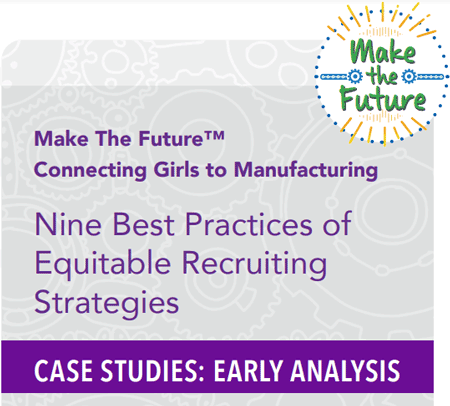 The case studies discuss crucial strategies to bridge the skills gap in manufacturing by addressing the historical marginalization of women and people of color. The Toyota USA Foundation, recognizing the need for a demographic shift, has partnered with the National Alliance for Partnerships in Equity (NAPE) to create outreach tools and strategies for educators and career recruiters.
The case studies discuss crucial strategies to bridge the skills gap in manufacturing by addressing the historical marginalization of women and people of color. The Toyota USA Foundation, recognizing the need for a demographic shift, has partnered with the National Alliance for Partnerships in Equity (NAPE) to create outreach tools and strategies for educators and career recruiters.
As part of the Make the Future™ Initiative, NAPEEF is focused on promoting best practices to increase the participation of women, particularly Black, Indigenous, and Native women and girls of color, in STEM and Career and Technical Education (CTE) leading to advanced manufacturing careers.
The case studies, conducted by NAPE’s external evaluator WhitworthKey Consulting, highlights the collaboration’s efforts in data collection and evaluation, specifically in San Antonio, Texas, and Vincennes, Indiana. These case studies aim to showcase the effectiveness of Nine Best Practices for Equitable Recruitment, validating strategies to recruit and retain women and women of color in Advanced Manufacturing Technician (AMT) programs.
The program’s objectives include increasing interest and participation in advanced manufacturing among BIPOC girls and women, developing additional resources for professional development, and increasing educators’ access to these resources.
The Case Study emphasizes the importance of understanding challenges faced by different communities and aligning them with observed problems. The findings and recommendations from the report aim to provide educators with real-time modifications to current programs and practices, fostering inclusivity and diversity in the manufacturing sector.
The comprehensive report is organized into sections, including profiles of the participating AMT sites, methodology, validation of Nine Best Practices of Equitable Recruitment, and conclusions. The insights derived from this initiative are instrumental in creating tools and resources for educators, ultimately shaping a more inclusive future in advanced manufacturing.

NAPE is a 501(c)(6) nonprofit organization
The NAPE Education Foundation is a 501(c)(3) nonprofit organization
© Copyright 2023. All rights reserved.